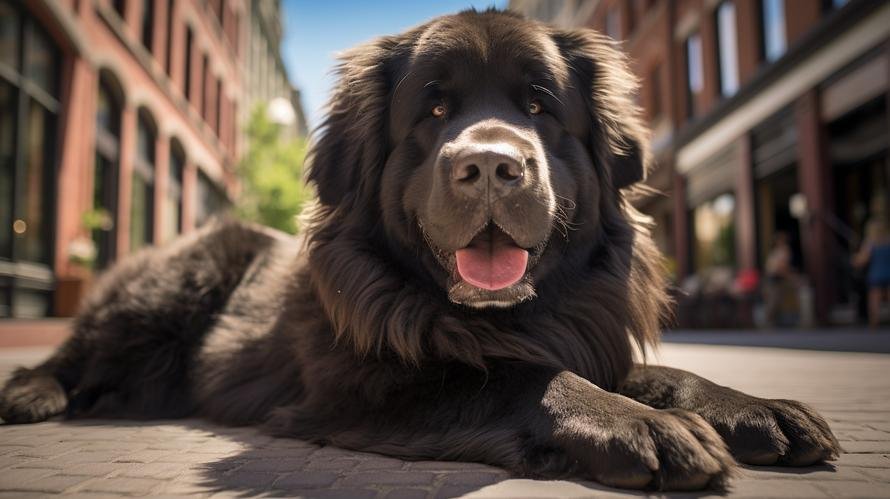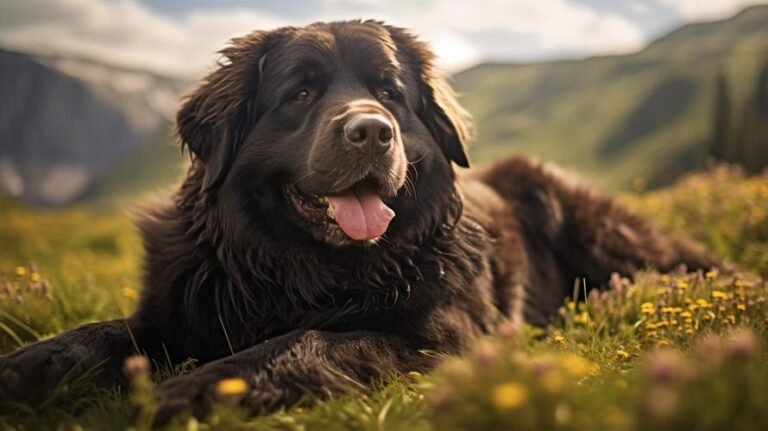Nestled in the easternmost part of Canada, where the North Atlantic Ocean embraces the shores, is the province of Newfoundland and Labrador. And from this stark, beautiful land originates the majestic Newfoundland Dog, affectionately called the Newf or Newfie by enthusiasts. But did you know these imposing creatures, large as bears but with the gentleness of a summer breeze, are superbly engineered for saving lives in water?
Newfoundlands come pre-installed – if you will – with massive lung capacity, a dense double coat that repels water, and webbed feet that function like flippers. Not many breeds can boast of having their very own breaststroke style. Yes, the Newfoundland dog swims with a modified technique that’s more reminiscent of a breaststroke than the doggy paddle we see in most breeds.
They were a prized possession of fishermen in Newfoundland because they could easily jump in and out of icy water, save drowning fishermen, pull in nets full, and even haul wood from forests. They were literally the lifeguard, water-taxi, and tractor rolled into one, helping humans survive in harsh frontier landscapes.
Now, that we’ve told you a tad about history and what these dogs were bred for, your next logical question might be – would a Newfoundland make a good family dog? It’s a question worth exploring. After all, bringing a dog into your family home is not to be taken lightly. It’s a decision that can impact your lifestyle, particularly when you are considering a large breed like the Newfoundland.
Newfoundlands, despite their size, are known for their gentle demeanor. Thomas Jefferson, the third US President, praised the breed for its “majestic simplicity and native dignity.” In modern terms, they are the gentle giants of the dog world.
One of the charming things about Newfies is their innate love for children. Their loving and protective nature, coupled with their patience, makes them the original nanny dogs. They are known to guard the children they are entrusted with and will not hesitate to put themselves in harm’s way to protect them. Remember Nana from Peter Pan? That’s right, she was a Newfoundland.
Given their history and their huge size, though, they need ample space to move around. While they are not high-energy dogs, daily walks, swimming sessions, and playtime are necessary to keep them healthy. Contrary to working tirelessly on the harsh shores of Newfoundland and Labrador, Newfoundlands are prone to obesity, so it’s crucial to provide an appropriate diet and activity level.
These dogs have a level-headed temperament, they are easy to train, and they have an eager-to-please personality. However, training should start at an early age and should center on positive reinforcement methods. They are sensitive creatures, and harsh disciplinary methods can have a detrimental effect on them.
Some prospective dog owners might worry that a larger dog means a more aggressive dog, but that’s not the case with Newfoundlands. They are truly gentle giants, compassionate and protective, but not aggressive. However, this does not mean that they would not protect their families. A Newfoundland dog senses danger and will not hesitate to put itself between its family and the perceived threat.
Like any other dog, Newfoundlands aren’t without potential health issues. They are prone to some hereditary conditions such as hip and elbow dysplasia, heart conditions, and cystinuria—a type of kidney disorder. Given these potential health concerns, it’s essential to get your Newfie from a responsible breeder who can provide health clearances.
Beware of the drool though! If you’re squeamish about slobber, then maybe, just maybe, a Newfoundland might not be a good fit. Aside from this, consistent grooming is also required to keep their thick, water-resistant coat in good shape.
In conclusion, a Newfoundland can make an excellent family dog. They are gentle, affectionate, protective, and they have a special affinity for children. They are not perfect; no breed is. What is important, though, is that their strengths, such as their love for children, their protective nature, and their training readiness, when coupled with a family that provides them with the care they need, make the Newfoundland a formidable family companion.
Newfoundland dogs are an embodiment of the phrase “a dog is a man’s best friend.” Their loyalty, hard work, and courage in the face of adversity is nothing less than inspiring. And as a treasured part of your family, a Newfoundland teaches us life’s most precious lesson, the joy of giving, and receiving, unconditional love.



